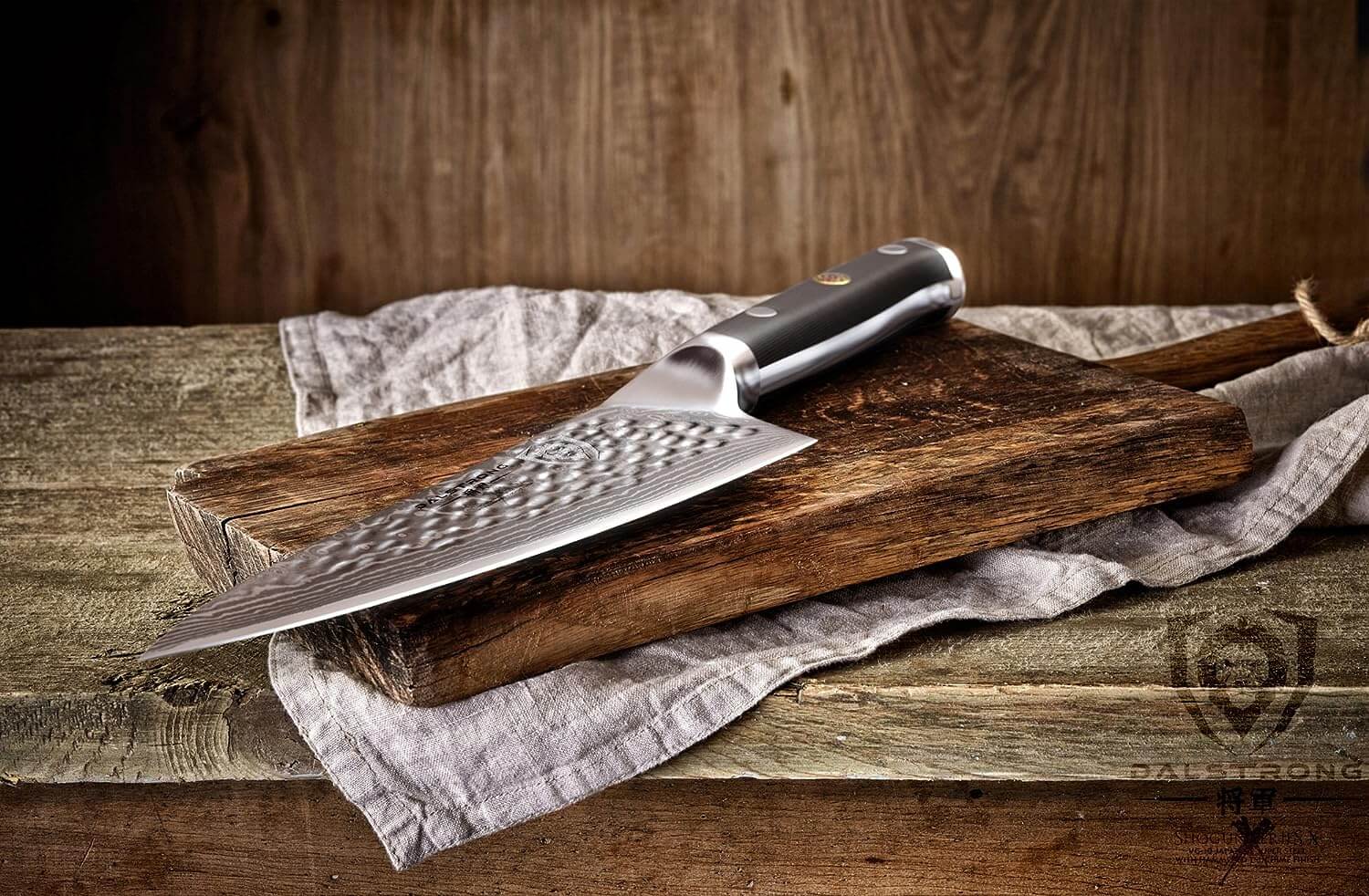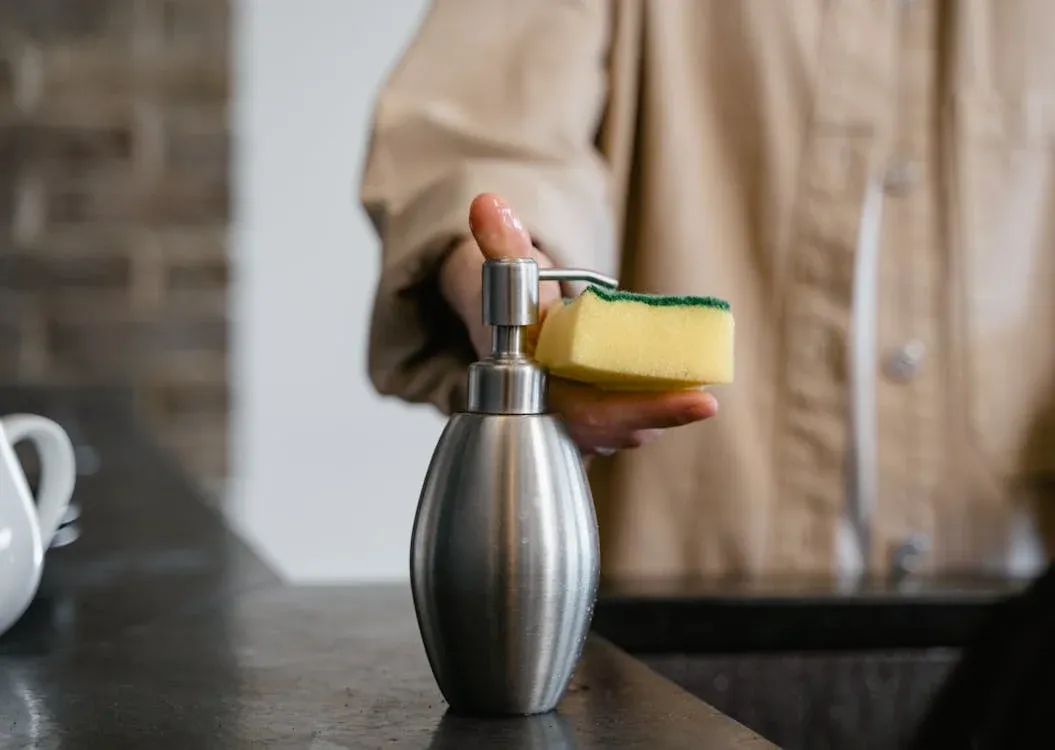Ever sliced through a tomato as if it were butter? Or effortlessly diced an onion without shedding a tear? Welcome to the world of Damascus steel chef's knives!
These aren't just any ordinary knives; they're the descendants of ancient swords once wielded by legendary warriors. While they might not be battling foes today, their razor-sharp edge and unmatched durability make every culinary challenge feel like child's play.
Dive in, and discover the magic of Damascus!
4 Best Damascus Chef Knives
- Best Overall: DALSTRONG Chef Knife
- Editor's Choice: Oxford CHEF's Chef Knife
- Best on a Budget: Sunnecko Chef Knife
- Best Gift Option: FANTECK Damascus Chef Knife
1. Best Overall

DALSTRONG Chef Knife
This knife stands out as the pinnacle of craftsmanship and material quality. With its military-grade handle, superior build, and exceptional blade, it's the top choice for those seeking the best in both performance and longevity.
What We Love:
- Handle: Military-grade, ergonomic, and heat-resistant.
- Build: Superior craftsmanship with protective sheath.
- Blade: Ultra-sharp, 'Zero-balance' design, nonstick.
What to Keep in Mind:
- Price: Premium investment.
Why It Might Be Right for You:
For the culinary enthusiast, the DALSTRONG Chef Knife is a game-changer. Its precision and design cater to both professional chefs and passionate home cooks. The blade's unique 'tsunami-rose' Damascus pattern is not just visually stunning but also high-performing. While it's a premium investment, the enduring quality and enhanced cooking experience it offers make it invaluable.
Customer Review (source: Amazon)
After using Dalstrong's Shogun Series chef knife, it's clear that it's crafted for professionals. Made from premium Japanese VG10 high-carbon super steel, its blade is incredibly sharp. The 9.5" length is favored by many professionals, and its unique Damascus pattern combined with the Dalstrong engravings make it a standout piece. The G10 fiberglass handle is designed for a comfortable and precise "pinch grip." Beyond its striking appearance, its performance is on par with high-end Japanese kitchen knives.
Blade Material: Damascus Steel- 67 Layers, AUS-10V Japanese super steel | Blade Length: Different sizes available | Handle Material: Ultra-G10
2. Editor's Choice
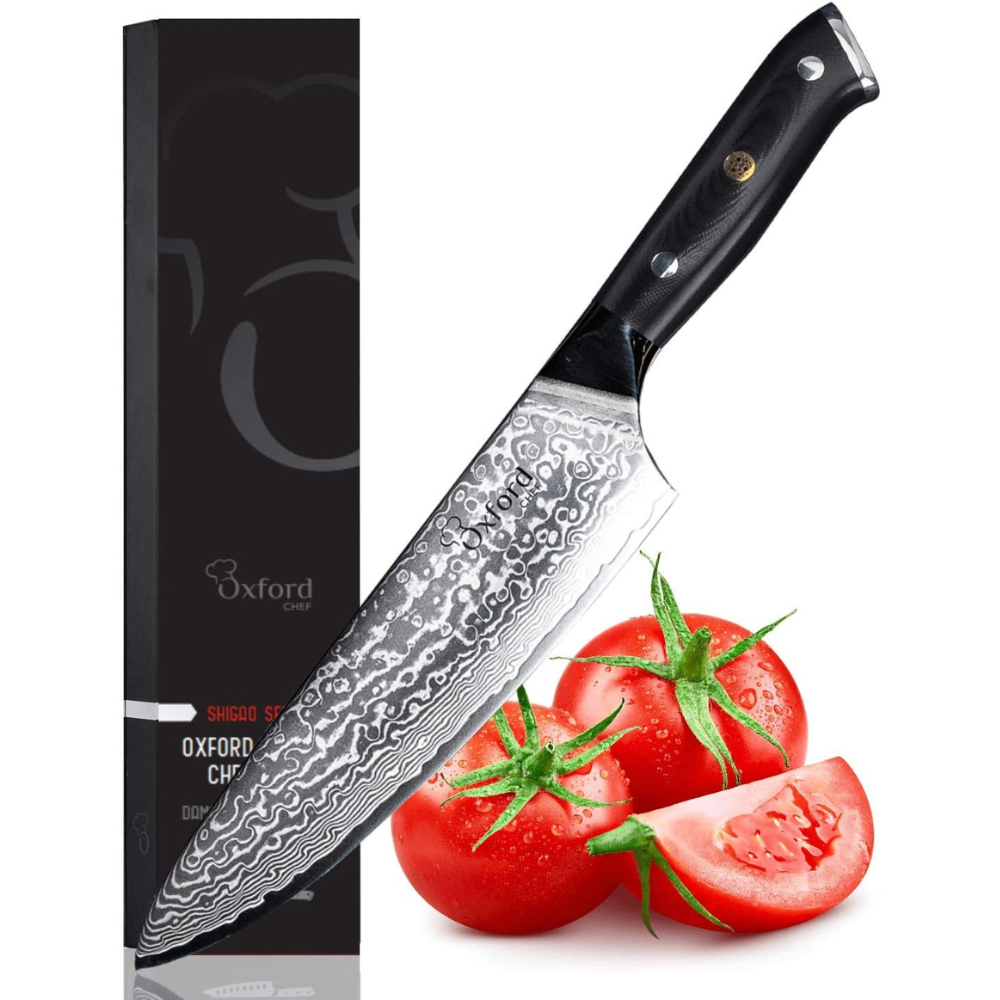
Oxford CHEF's Chef Knife
Offering a balance of quality and value, this knife is notable for its exceptional performance, military-grade handle, and generous warranty. It's a versatile choice that's well-suited for both professionals and home cooks.
What We Love:
- Value: High-quality craftsmanship at an affordable price.
- Performance: G-10 military-grade handle with ergonomic grip.
- Warranty: Lifetime guarantee and free sharpening service.
What to Keep in Mind:
- Weight: Slightly heavier than some other models.
Why It Might Be Right for You:
In the heart of a bustling kitchen, precision and reliability are paramount. The Oxford CHEF's Chef Knife, with its authentic Japanese VG-10 “Super-Steel” core, ensures every slice is clean and every chop is accurate. Its weight, while initially noticeable, becomes an asset, allowing for effortless cuts through even the most delicate of tomatoes. Coupled with the assurance of a lifetime guarantee, this knife becomes more than just a tool—it's a long-term culinary partner.
Customer Review (source: Amazon)
The moment this knife arrived, its quality was evident. From the impeccable packaging to the knife's performance, it's clear this company values excellence. As a knife enthusiast, I immediately tested its sharpness, and it effortlessly shaved my arm hair. In the kitchen, it's transformed our cooking experience. I usually handle the cooking, but since getting this knife, my wife's been eager to prepare every meal.
Blade Material: Damascus Steel- 67 Layers, VG-10 Japanese Steel | Blade Length: 8 inches | Handle Material: Military-grade G-10.
3. Best on a Budget
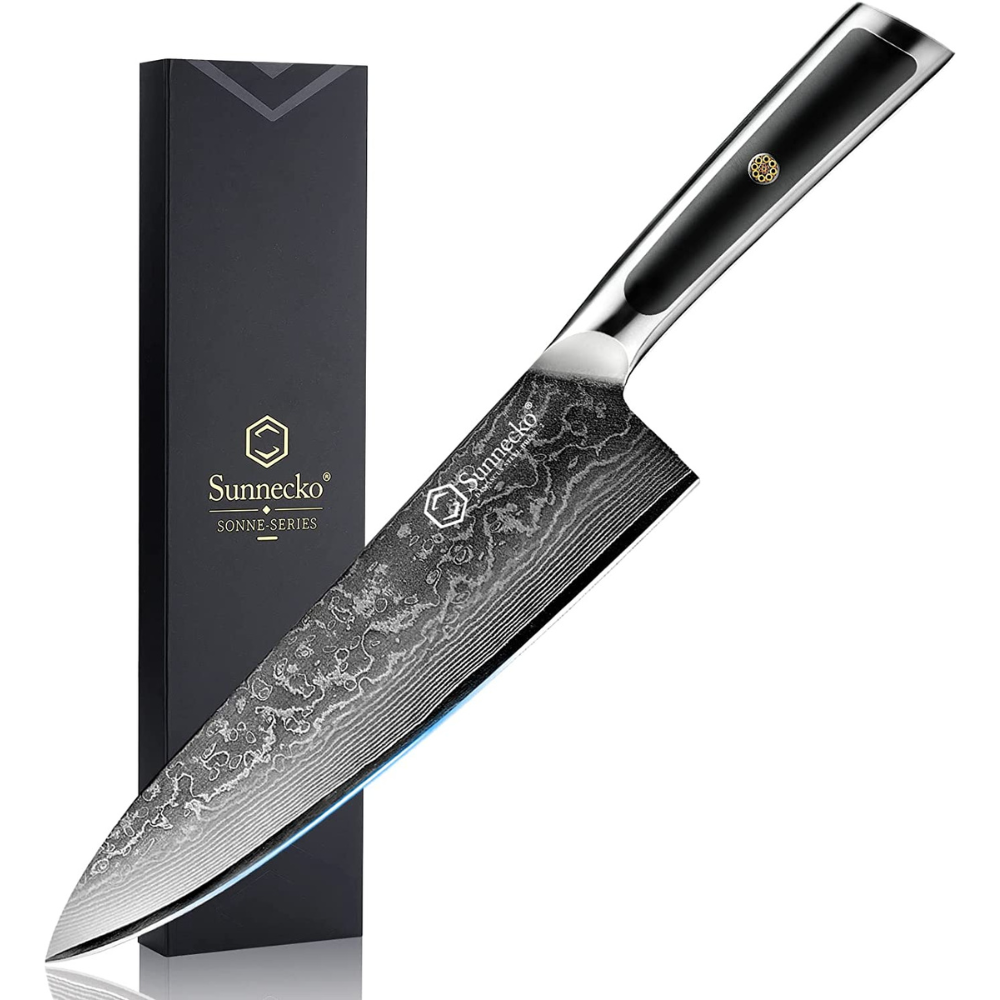
Sunnecko Chef Knife
This knife provides remarkable quality at an accessible price point. Its durable VG-10 steel blade and balanced design make it a top pick for those seeking value without compromising on quality.
What We Love:
- Budget-Friendly: High-quality VG-10 steel blade at an affordable price.
- Durable Blade: Rockwell hardness of around 60, ensuring longevity and sharpness.
- Aesthetically Pleasing: Premium appearance that rivals more expensive knives.
- Balanced Design: Perfectly balanced for efficient and comfortable use.
- Versatility: Suitable for both home and professional use, handling a majority of kitchen tasks.
What to Keep in Mind:
- Handle Concerns: Visually appealing but lacks ergonomics and can be slippery.
- Non-Nonstick Blade: The blade isn't nonstick, which might affect ease of slicing and cleaning.
Why It Might Be Right for You:
In a kitchen where every penny counts, the Sunnecko Chef Knife shines as a beacon of value. Its blade, reminiscent of those found in pricier counterparts, ensures precision in every slice. While it might not boast the most ergonomic handle, its balance and sharpness make up for it. Whether you're a culinary student just starting out or a home cook on a budget, this knife promises performance without breaking the bank.
Customer Review (source: Amazon)
Having owned high-end brands like Shun and Wustoff, I've realized that sometimes you're just paying for the name. As an avid cook, the quality of my knives is paramount. This knife checks all my boxes: it boasts the sharp 10-15 degree blade angle typical of Asian knives, is crafted from VG-10 steel ensuring prolonged sharpness, and is a Damascus steel, enhancing its hardness. The carbon, chromium, and cobalt content in the steel also play a crucial role in its performance. Packaged in a sleek box with a protective sleeve, it's gift-ready. I've been using it daily for over a month, and its performance remains unmatched, making slicing and chopping a breeze. Plus, the handle's design is both functional and aesthetically pleasing.
Blade Material: VG-10 Japanese Steel, 67-Layer Damascus High Carbon | Blade Length: 8 inches | Handle Material: Stainless Steel with polypropylene at the middle
4. Best Gift Option
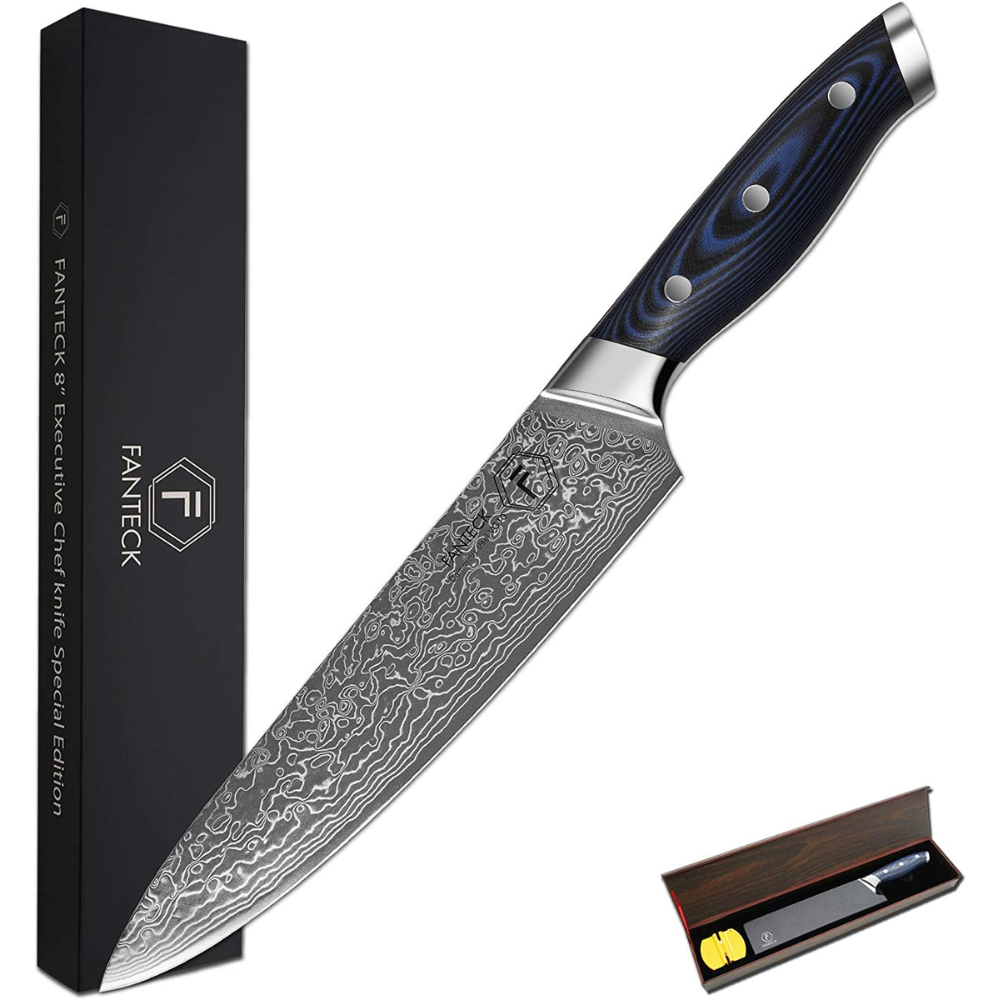
FANTECK Damascus Chef Knife
With its attractive packaging, sheath, and mini sharpener, this knife is the ideal gift. Its visually appealing design combined with a 97-layer Damascus blade ensures it's a cherished gift for any culinary enthusiast.
What We Love:
- Gift-Ready: Comes in a beautiful gift box with a sheath and mini sharpener.
- Aesthetically Pleasing: Visually appealing 97-layer Damascus blade.
- Handle Quality: Ergonomic design with a comfortable grip and good balance.
- Durability: Known for its long-lasting build and resilience.
- Warranty: Generous money-back guarantee for peace of mind.
What to Keep in Mind:
- Blade Stickiness: The blade isn't nonstick, which might affect ease of cleaning and slicing.
Why It Might Be Right for You:
In the midst of a bustling kitchen, the FANTECK Damascus Chef Knife stands out not just for its functionality, but also its elegance. Whether you're a seasoned chef or a home cook, the knife's sharpness and ergonomic handle ensure a seamless cooking experience. And if you're thinking of a thoughtful gift for a culinary enthusiast, this knife, with its beautiful packaging and added accessories, is sure to impress. It's not just about cutting; it's about elevating the entire cooking process.
Customer Review (source: Amazon)
Blade Material: 67-layer Damascus high-carbon stainless steel, VG-10 Japanese Steel| Blade Length: 8 inches | Handle Material: Ergonomic G10.
How We Chose Our Top Picks
Expertise Behind Our Reviews
Our goal is to provide you with expert insights into these Damascus chef knives, even if we don't have personal experiences with each product. We've conducted extensive research and considered user feedback, including customer reviews from Amazon, to evaluate their performance, durability, and ease of use. Additionally, we'll compare these knives against their competitors to help you find the perfect match for your culinary needs.
How We Made Our Selection
We embarked on a comprehensive search across the internet for the best Damascus knives under $100. Recognizing the diverse needs of our readers, we established four budget ranges within the $50 to $100 spectrum.
Our methodology was rigorous. We began by assessing the durability of each knife, primarily through customer reviews, ensuring that our recommendations would stand the test of time. Next, we delved into the materials, paying close attention to both the blade and handle, as these are crucial for performance and user comfort. Ease of use was another paramount criterion; after all, a knife should be an extension of the chef's hand. Lastly, versatility was on our radar. A top-tier knife should be adept at a range of tasks, from delicate slicing to robust chopping.
After evaluating these factors, we shortlisted four knives, each representing the best in its respective budget range. Our selections are the culmination of meticulous research, ensuring that you're equipped with the best information to make an informed choice.
How To Identify Damascus Knives
Are you wondering how you could identify a Damascus steel knife? Its blade has a molted pattern. However, it is easy to duplicate that pattern on a regular steel blade, and many manufacturers sell fake Damascus chef knives.
As a newbie, you might be unable to tell the difference between a real and a fake Damascus chef knife. So, we have taken it upon ourselves to bring you the best Damascus chef knife options mentioned above.
However, we believe you should be fully aware of what makes Damascus chef knives different. So, we have explained the comparison of Damascus and Stainless Steel Knives.
Stainless Steel VS Damascus: A Comparative Analysis
When it comes to kitchen knives, the type of steel used plays a pivotal role in determining its performance, durability, and aesthetics. Two of the most popular materials in the knife-making world are Stainless Steel and Damascus. Let's delve into the differences and similarities between these two:
1. Origin and Composition:
- Stainless Steel: A modern alloy primarily made of iron, carbon, and at least 10.5% chromium content. The chromium gives it its signature resistance to rust and staining.
- Damascus: An ancient blend of steels, often combining both hard and soft steels in layers. This results in a unique wavy or water-like pattern on the blade.
2. Durability and Hardness:
- Stainless Steel: Generally durable and resistant to corrosion. The hardness can vary based on the specific type of stainless steel used.
- Damascus: Known for its exceptional toughness due to the combination of hard and soft steels. This layering technique provides a balance between flexibility and edge retention.
3. Sharpness and Edge Retention:
- Stainless Steel: Offers a decent edge that's relatively easy to maintain. However, it might require more frequent sharpening than high-quality Damascus blades.
- Damascus: Renowned for its razor-sharp edge and superior edge retention, especially when crafted with high-carbon content.
4. Aesthetics:
- Stainless Steel: Typically has a clean, shiny, and uniform appearance.
- Damascus: Stands out for its distinctive patterns, making each Damascus kitchen knife a unique piece of art.
5. Maintenance:
- Stainless Steel: Requires minimal maintenance due to its resistance to rust. It's often considered more user-friendly, especially for those who might not be diligent with immediate cleaning and drying.
- Damascus: While it boasts superior performance, it requires careful maintenance. It's essential to clean and dry a Damascus chef's knife immediately after use to prevent potential rusting or staining.
6. Price:
- Stainless Steel: Generally more affordable, making it a popular choice for everyday kitchen use.
- Damascus: Often comes at a premium due to the intricate process of making it and its unique appearance.
Conclusion:
While both Stainless Steel and Damascus have their merits, the choice boils down to personal preference, intended use, and budget. If you're looking for a workhorse for daily tasks with minimal maintenance, stainless steel might be your pick. However, if you're in the market for a unique, high-performing blade and are willing to provide it with the care it deserves, a Damascus kitchen knife could be your culinary companion.
Buyer's Guide: Features to Look For
1. Steel Type:
- Carbon Steel vs. Stainless Steel: Damascus knives can be made from either carbon steel or stainless steel. Carbon steel is known for its superior sharpness and edge retention but can be prone to rust if not properly cared for. Stainless steel is more resistant to corrosion but might not hold its edge as long as carbon steel.
- VG-10 Steel: A popular choice for high-quality Damascus knives, VG-10 is a type of stainless steel with added vanadium, making it especially hard and durable.
2. Number of Layers:
- Layer Count: The number of layers in a Damascus blade can vary, with some having as few as 20 layers and others boasting over 500. More layers often mean increased toughness and a more intricate pattern.
- Pattern and Aesthetics: The layering process results in the distinctive wavy patterns associated with Damascus steel. The number of layers can influence the intricacy of this pattern.
3. Handle:
- Material: Handles can be made from a variety of materials, including wood, bone, synthetic materials like G10, or even metal. The choice of material can influence the knife's weight, balance, and overall feel.
- Ergonomics: A well-designed handle should fit comfortably in your hand, allowing for a secure grip and reducing hand fatigue during prolonged use.
- Full Tang: A full tang means the blade extends through the handle, providing better balance and durability.
4. Additional Features:
- Sharpness: While Damascus knives are renowned for their sharpness, it's essential to ensure that the knife you choose comes with a finely honed edge.
- Blade Thickness: A thinner blade often allows for more precise cuts, while a thicker blade might be more durable for heavy-duty tasks.
- Protective Sheath or Case: Some knives come with a protective sheath or case, which can be beneficial for storage and safety.
- Warranty: A warranty can be a testament to the manufacturer's confidence in the product. Look for knives that come with a warranty, ensuring that you're covered in case of defects or issues.
Conclusion:When investing in a Damascus chef's knife, it's crucial to consider the features that align with your culinary needs and preferences. By paying attention to the steel type, number of layers, handle design, and additional features, you can find a knife that not only looks stunning but also elevates your cooking experience.
Frequently Asked Questions
People are often intimidated by Damascus knives because they don't know how to care for or use them.
Many people avoid Damascus knives because they're worried they'll ruin the knife if they don't know how to use it properly.
We've compiled a list of the most frequently asked questions about Damascus knives to feel confident in your purchase and use. Our guide covers everything from cleaning and sharpening to using and storing your knives.
How much is a good Damascus knife worth?
A Damascus steel chef knife is worth anywhere from $50 to a couple of thousand, depending on the quality and intricacy of the blade.
Due to their beautiful design and exceptional craftsmanship, Damascus knives are some of the most desired knives in the world. Knives made with Damascus steel are known for their durability, sharpness, and resistance to wear and tear. This makes Damascus knives worth more than non-Damascus knives. They are known for strength and beauty, so knife collectors are usually willing to pay a higher price for a damascus steel chef's knife.
How much a Damascus knife is worth depends on the steel's quality, the blade's craftsmanship, and the knife's rarity. A good Damascus knife can be worth several hundred dollars or more, while a lower quality or less rare knife might only be worth a few dozen dollars.
Is Damascus the sharpest?
Damascus steel is renowned for its ability to hold a sharp edge, but it's not necessarily the sharpest steel by default. The sharpness of a knife depends on its edge geometry, the hardness of the steel, and the quality of the sharpening process. Damascus steel knives can be honed to a very sharp edge due to the quality of the steel and its unique layered structure.
However, there are other high-carbon steels and specialized alloys that can also be sharpened to an extremely fine edge. The advantage of Damascus is its combination of sharpness, edge retention, and aesthetic appeal. It's worth noting that the term "Damascus" primarily refers to the process of layering and folding steel to create a distinctive pattern, rather than a specific type of steel.
Do Damascus blades rust?
Yes, Damascus blades can rust. However, if you take care of them and oil them periodically, they will last a long time. To avoid rust, ensure when you wash your knife, you dry it immediately afterward.
Can you scratch Damascus?
Yes, Damascus steel can be scratched. Like any other steel, Damascus steel is susceptible to scratches, especially when it comes into contact with harder materials or abrasive surfaces. While the intricate patterns and designs on a Damascus blade can help mask minor scratches, it's still important to handle and maintain the knife with care to preserve its appearance and functionality. Regularly cleaning, properly storing, and using a soft cloth for wiping can help reduce the risk of scratches on a Damascus chef's knife or Damascus kitchen knife.
What is a Damascus chef's knife?
A Damascus chef's knife is a premium kitchen tool crafted from layers of steel, resulting in a distinctive wavy pattern on the blade. It combines aesthetics with functionality, offering a sharp edge and long-lasting durability.
How is a Damascus kitchen knife different from regular knives?
While both types of knives can be made from stainless steel, a Damascus kitchen knife is made by folding multiple layers of steel, creating a unique pattern and a blade known for its exceptional sharpness and edge retention.
Why are Damascus chef knives so expensive?
The process of making a Damascus blade is labor-intensive, requiring skilled craftsmanship. The unique layering technique and the high-quality steel used contribute to its higher price point.
How do I care for my Damascus chef knife?
To maintain its sharpness and beauty, it's best to hand wash your knife, dry it immediately, and store it in a knife block or magnetic strip. Avoid using it on hard surfaces like glass cutting boards, and refrain from putting it in the dishwasher.
Is the pattern on a Damascus knife just for show?
While the wavy pattern is undoubtedly eye-catching, it's a result of the layering process and contributes to the blade's strength and flexibility.
How often should I sharpen my Damascus kitchen knife?
Less frequently than regular knives due to its superior edge retention. However, when it starts to lose its edge, use a whetstone or professional sharpening service to restore its sharpness.
Are all Damascus chef knives made in Damascus?
No, the name refers to the ancient technique of layering steel, which originated in regions around Damascus. Today, Damascus-style knives are produced worldwide.
Can I use a Damascus chef knife for all kitchen tasks?
While it's versatile and can handle most tasks, it's best to avoid using it for heavy-duty tasks like breaking bones. Instead, use it for slicing, dicing, and chopping for optimal performance.
Which Option of Best Damascus Knives Is Best For You?
Armed with knowledge about the intricacies of Damascus steel, you're now poised to make an informed choice. Whether you prioritize durability, ease of maintenance, or sheer beauty, there's a Damascus knife out there tailored just for you. Dive into the world of Damascus knives and discover a blend of ancient craftsmanship and modern culinary excellence.
Thank you for joining us on this journey. Happy slicing and dicing!
Items Reviewed:
- Best Overall: DALSTRONG Chef Knife
- Editor's Choice: Oxford CHEF's Chef Knife
- Best on a Budget: Sunnecko Chef Knife
- Best Gift Option: FANTECK Damascus Chef Knife

Best Overall: DALSTRONG Chef Knife
This knife stands out as the pinnacle of craftsmanship and material quality. With its military-grade handle, superior build, and exceptional blade, it's the top choice for those seeking the best in both performance and longevity.
Further Reading
- Layers of Damascus Chef Knives: Metallurgy Explained: Learn the complexities of the layering technique and learn how the fusion of metals imparts remarkable durability and suppleness to these knives.
- Damascus vs. Stainless Steel Chef Knives: Comparison: Learn the advantages and disadvantages of each to discern which knife aligns seamlessly with your culinary preferences.
- If you're intrigued by the world of Damascus knives, explore the enlightening article "5 Interesting Facts about Damascus Knives" by Damas Knives to uncover unique insights.
Please note that the reviews on this page have been edited for readability and clarity while maintaining the essence of the original content.
